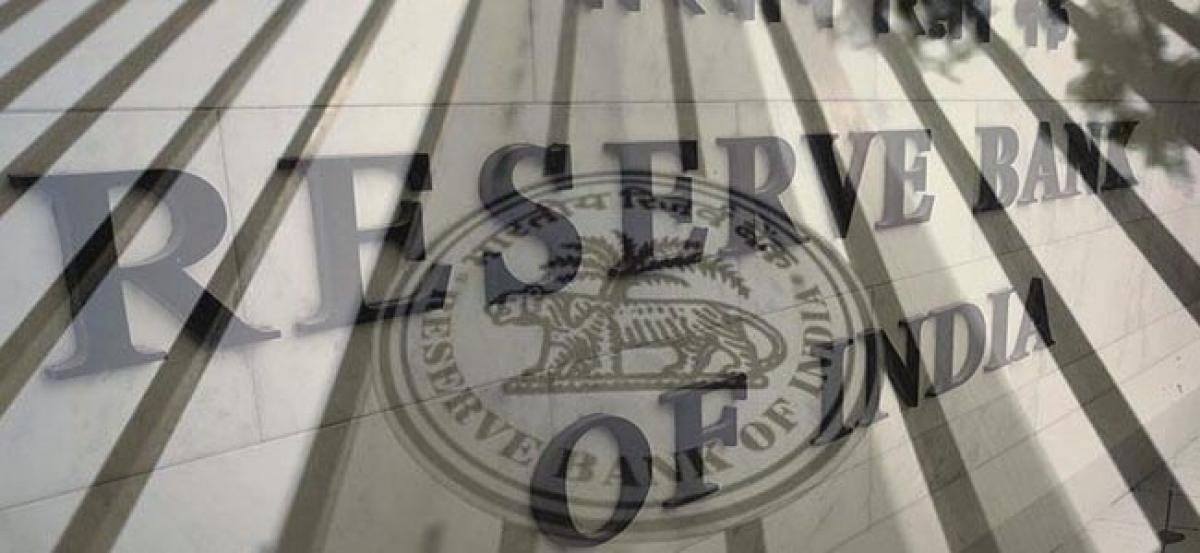Live
- Bengal: Senior resident doctor accused of rape, attempt to murder absconding
- Prateeksha Srivastava says she seldom meets fellow music composers Rusha, Blizza, in person
- KTR Accuses Government of Brutality Against Farmers, Calls for Immediate Action
- Manchu Manoj Attends Shooting Amid Family Controversy
- BWF World Tour Finals: Treesa-Gayatri defeat Malaysian pair to keep semis hopes alive
- MUDA case: Complainant Krishna asks Lokayukta to file new plaint on CM Siddaramaiah on ED’s report
- Airport capex in India to cross Rs 60,000 cr in fiscals 2025-2027 to handle growing traffic: Crisil
- Five-Year-Old Boy Dies After 55-Hour Rescue from Borewell in Rajasthan's Dausa
- Chaos in Parliament over Congress-George Soros link claims, BJP MP poses questions
- Bus Driver Arrested After Deadly Accident in Mumbai’s Kurla; 42 Injured
Just In

The Reserve Bank of India is unlikely to cut interest rates despite the India Inc\'s wish, given continuous pressure on the rupee and
New Delhi: The Reserve Bank of India is unlikely to cut interest rates despite the India Inc's wish, given continuous pressure on the rupee and other global factors impacting it, industry lobby Assocham said on Sunday.
"The prospects for cut in the policy interest rates by the Reserve Bank of India (RBI) may be adversely affected by continuous pressure on the rupee against the dollar, firming of the US interest rates along with the hardening of the crude oil prices," a statement by the industry association said.
The Associated Chambers of Commerce and Industry of India issued the statement here citing its study on the unfolding macro-economic scenario.
"It is true that there is an ample liquidity in the banking system following demonetisation and lowering of inflation both at the WPI (wholesale price index) and CPI (consumer price) levels, but then this cannot be taken as a normal situation," it said.
"Once the scrapped Rs 500 and Rs 1,000 notes are replaced and fresh currency is injected back into the system fully, the ball game would change," it adeded.
"Besides, there are certain commodities like sugar and wheat which are witnessing firming of prices."
Assocham said the biggest risks were emanating from the sharp strengthening of the US dollar, raking in international money back into the American economy, as seen in the huge outflows, from emerging markets putting pressure on their currencies.
"While India may get consolation from the fact that we are less affected, the fact is we are amongst the largest crude oil importers in the world and net importing country."
"So, the dollar strengthening has a direct and immediate impact on the country's overall balance of payment position and would lead to inflation in the medium term," the statement added.
The US Federal Reserve on Wednesday increased its key interest rate by 25 basis points in the first rate hike in 2016 and just the second in a decade.
It raised rates by 0.25 percentage points to a range of 0.50 per cent and 0.75 per cent.
"We are slowly moving away from a highly beneficial position of low crude oil prices and a stable and strong rupee which made the landed cost of energy quite cheap," Assocham President Sunil Kanoria said in the statement.
"This has helped the government finances as also benefited the consumers," he said.
"Now, we are getting into the reverse position where crude oil is firming up and rupee is becoming weaker. Thus, it would be a double whammy of increased import bill in dollar terms and on top of it, higher landed cost on account of weaker rupee," he added.
The industry association also said the play-out of the November 8 demonetisation measure remains to be seen in terms of impact on the Gross Domestic Product (GDP), while uncertainty over implementation of the Goods and Services Tax (GST) has increased.
"Thus, however much we in the industry might like to see lowering of interest rates, the macro picture may make it a difficult proposition", it said.
In a surprise move earlier in December, the RBI kept its key lending rate unchanged, citing global and local uncertainties.
The RBI's Monetary Policy Committee (MPC), during its second bi-monthly monetary policy review -- the fifth of the fiscal -- kept the repurchase rate, or the short-term lending rate it charges on borrowings by commercial banks, unchanged at 6.25 per cent.
According to the panel, its decision to keep the key lending rates unchanged was taken after considering various global and local factors, such as a likely hike in the US interest rates.
Commenting on the move, Kanoria said, "A cut in interest rate would not have made much of difference to the credit offtake in the midst of the industry being over-leveraged and the consumer demand remaining tepid because of scrapping of high-value currency notes."

© 2024 Hyderabad Media House Limited/The Hans India. All rights reserved. Powered by hocalwire.com







